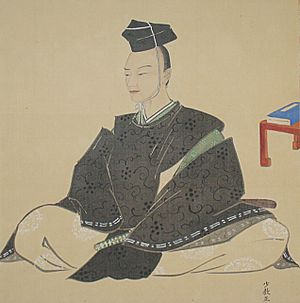Tanuma Okitsugu facts for kids
Quick facts for kids
Tanuma Okitsugu
|
|
|---|---|

Tanuma Okitsugu
|
|
| Lord of Sagara | |
| In office 1767–1786 |
|
| Preceded by | Honda Tadanaka |
| Succeeded by | Tanuma Okiaki |
| Personal details | |
| Born | September 11, 1719 Edo, Japan |
| Died | August 25, 1788 (aged 68) Edo, Japan |
Tanuma Okitsugu (田沼 意次) (born September 11, 1719, in Edo, Japan – died August 25, 1788, in Edo) was an important government official in Japan. He served as a special advisor (called a sobashū) and a senior counselor (rōjū) to the shōgun Tokugawa Ieharu. The shogun was the military ruler of Japan during the Edo period. Tanuma and his son became very powerful, especially during the last 14 years of Shogun Ieharu's time in charge. Tanuma is known for trying to fix Japan's economy and for a lot of corruption in the government. He was also a daimyō, which means a powerful lord, of the Sagara Domain.
Contents
Fixing Japan's Economy
Tanuma wanted to solve big problems in Japan's economy. He especially wanted to balance trade between different parts of the country. The shogun before him, Tokugawa Yoshimune, tried to save money and focus on farming. But Tanuma had different ideas.
New Economic Plans
Tanuma tried several new things to improve the economy:
- He changed the value of money.
- He sold special rights to merchants, letting them be the only ones to sell certain goods.
- He also started taxing groups of merchants.
Boosting Trade and Exports
To stop too much money from leaving Japan, Tanuma worked to increase exports to other countries. He set limits on how much copper could be sent out from the Akita Domain's mines. Copper was important because it was used to make coins back then.
New Business Opportunities
Tanuma's government also gave special business rights for many products. These included things like iron, brass, sulfur, and lamp oil. He also invested a lot of money in a huge project to drain land. This was done to create more land for farming.
Challenges and Changes
Even though Tanuma wanted to help the country, he was also involved in a lot of corruption. This made corruption in the government even worse.
Famine and Unrest
Japan faced tough times with several years of bad harvests. From 1783 to 1787, there were droughts followed by floods. This led to a terrible famine, where many people didn't have enough food. Because of this, there were often riots and protests.
A Son's Assassination
In 1784, Tanuma's son, Tanuma Okitomo, was killed inside Edo Castle. Okitomo was a junior counselor. He was killed right in front of his father after a meeting. A samurai named Sano Masakoto killed him. People thought that other important government figures might have been involved, but only the killer was punished.
Fall from Power
The famine caused many protests and even peasant rebellions. There were big riots in Edo in 1787. People who didn't like Tanuma's changes said that these problems were a sign from "Heaven." After his son was killed and his supporter, Shogun Tokugawa Ieharu, died, Tanuma lost his power. This meant that his economic changes and plans to relax Japan's rules about staying isolated were stopped.
See also
- Tenmei
- Kuze Hirotami
- Matsudaira Sadanobu
 | Roy Wilkins |
 | John Lewis |
 | Linda Carol Brown |

